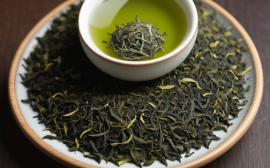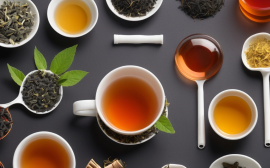A Revolution Brewing: Tea’s Urban Renaissance
In the bustling heart of major metropolitan areas, a quiet revolution is brewing. No longer relegated to the realm of quaint tea rooms or dusty grocery shelves, tea has undergone a dramatic transformation, emerging as a vibrant and dynamic element of urban culture. From the proliferation of specialty tea shops and cafes to the innovative ways in which traditional tea ceremonies are being reinterpreted, tea is captivating a new generation of urban dwellers. This article delves into the multifaceted evolution of urban tea culture, exploring the forces that are shaping its trajectory and the trends that are defining its future.
This resurgence is fueled by a confluence of factors. The health benefits of tea, long touted in traditional medicine, are now supported by scientific research, attracting health-conscious consumers. The growing awareness of sustainable tea sourcing and ethical tea sourcing practices has also resonated with ethically minded millennials and Gen Z, who are increasingly prioritizing brands that align with their values. Moreover, the rise of social media tea trends, amplified by tea influencer marketing, has transformed tea from a simple beverage into a visually appealing and culturally relevant lifestyle choice.
The modern tea experience extends far beyond a simple cuppa. Specialty tea shops are curating immersive environments, offering tea-pairing menus that rival those of fine-dining establishments, and educating consumers on the nuances of different tea varieties. Tea cafes are becoming social hubs, fostering community and providing a space for mindful consumption. This shift reflects a broader cultural movement towards slowing down and savoring the moment, a counterpoint to the frenetic pace of urban life. The future of tea, therefore, lies not only in the quality of the brew but also in the holistic experience it provides.
Innovation further propels this urban tea culture, manifesting in unexpected forms such as tea cocktails and tea-infused desserts. Bartenders are experimenting with tea infusions to create complex and nuanced alcoholic beverages, while pastry chefs are incorporating matcha, hojicha, and other teas into delectable treats. These culinary creations demonstrate the versatility of tea and its ability to transcend traditional boundaries, appealing to a wider audience and solidifying its place in the modern urban landscape. The urban tea revolution is not just about drinking tea; it’s about experiencing it in new and exciting ways.
Specialty Tea Shops: Curating the Tea Experience
The urban landscape is now dotted with specialty tea shops and cafes, a far cry from the ubiquitous coffee chains that once dominated. These establishments are not merely serving tea; they are curating experiences. They offer an extensive selection of teas from around the globe, from delicate white teas to robust pu-erhs, often sourced directly from tea farms. The focus is on quality, craftsmanship, and education. Patrons can learn about the origins of their tea, the nuances of its flavor profile, and the proper brewing techniques.
Examples include establishments like “Song Tea & Ceramics” in San Francisco, known for its meticulously sourced Taiwanese oolongs, and “Bellocq Tea Atelier” in Brooklyn, which offers a curated selection of artisanal teas in a sophisticated setting. These shops often host tea tastings, workshops, and other events, fostering a sense of community and deepening appreciation for the art of tea. These specialty tea shops are vital hubs in the burgeoning urban tea culture, offering a counterpoint to the fast-paced, often impersonal experience of larger chains.
They champion the health benefits of tea, highlighting the antioxidant properties and potential for stress reduction associated with different varieties. Many tea cafes now feature tea-pairing menus, suggesting complementary foods that enhance the tasting experience, similar to wine pairings. This focus on education and mindful consumption appeals to health-conscious consumers and those seeking a more enriching and sensory experience. Beyond the traditional tea service, many of these establishments are embracing innovation, contributing to exciting tea trends.
Some are experimenting with tea cocktails, blending unique tea infusions with spirits and mixers to create sophisticated and refreshing beverages. Others are incorporating tea-infused desserts into their menus, showcasing the versatility of tea as an ingredient. Matcha, in particular, has become a popular addition to everything from ice cream to pastries, driven in part by social media tea trends and the visual appeal of its vibrant green hue. This fusion of tradition and modernity is key to attracting a younger demographic and ensuring the future of tea.
Furthermore, ethical tea sourcing is a growing concern for these specialty shops. Consumers are increasingly aware of the environmental and social impact of their tea choices, and they are seeking out businesses that prioritize sustainable practices. Many shops are committed to working directly with tea farms that adhere to fair labor standards and environmentally friendly farming methods. This commitment to sustainability not only resonates with ethically minded consumers but also helps to ensure the long-term health and viability of the tea industry. The emphasis on transparency and traceability is a hallmark of the modern urban tea experience.
Social Media’s Stir: Influencer Marketing and Tea Trends
Social media platforms, particularly Instagram and TikTok, have played a pivotal role in popularizing tea among millennials and Gen Z. Visually appealing tea lattes, aesthetically pleasing tea sets, and the overall ritualistic nature of tea preparation lend themselves perfectly to the curated world of social media. Influencer marketing has further amplified this trend, with lifestyle and food bloggers showcasing their favorite tea brands, recipes, and tea-related experiences. The hashtag #tea has billions of views across various platforms, demonstrating the widespread interest in tea-related content.
This digital exposure has not only increased awareness of different types of tea but has also transformed tea consumption into a lifestyle choice, associated with wellness, mindfulness, and sophistication. The rise of social media tea trends has significantly impacted urban tea culture, influencing everything from the aesthetics of specialty tea shops to the development of innovative tea-infused desserts. Tea cafes now design their spaces with Instagrammability in mind, featuring visually stunning displays of tea blends and brewing equipment.
Food bloggers, for example, frequently highlight tea-pairing menus, demonstrating how different teas can complement various dishes, thereby elevating the dining experience. This phenomenon extends beyond mere aesthetics; it’s about crafting a narrative around tea that resonates with a digitally savvy audience, transforming a simple beverage into a symbol of cultural awareness and refined taste. Tea influencer marketing has also played a crucial role in educating consumers about the diverse health benefits of tea and promoting sustainable tea sourcing practices.
Influencers often partner with ethical tea sourcing companies to showcase the origins of their teas, highlighting the importance of fair labor practices and environmentally friendly farming methods. These collaborations not only raise awareness about the ethical considerations behind tea production but also encourage consumers to make more informed purchasing decisions. Furthermore, many influencers are now incorporating tea into their wellness routines, emphasizing its antioxidant properties and its role in promoting relaxation and mindfulness, further solidifying tea’s position as a health-conscious beverage choice.
This focus contributes to the increasing demand for high-quality, sustainably sourced teas within the urban tea culture. Looking ahead, social media will continue to shape the future of tea, driving innovation in both product development and marketing strategies. Experts predict that augmented reality (AR) and virtual reality (VR) technologies will play an increasingly important role in enhancing the tea-drinking experience, allowing consumers to virtually explore tea gardens and learn about different tea varieties from the comfort of their homes. Moreover, the increasing popularity of tea cocktails and other tea-based culinary creations suggests that social media will continue to be a powerful platform for showcasing the versatility of tea and inspiring new and creative ways to enjoy this ancient beverage. As the urban tea culture evolves, social media will undoubtedly remain a key driver of trends, shaping consumer preferences and driving the industry forward.
Tradition Reimagined: Modern Adaptations of Tea Ceremonies
While traditional tea ceremonies and practices remain deeply rooted in cultures around the world, they are being adapted and reinterpreted in modern urban settings to appeal to a wider audience. Formal Japanese tea ceremonies (chado) are now offered in some urban centers, providing an authentic glimpse into this ancient tradition. However, more commonly, we see modernized versions that incorporate elements of mindfulness and meditation, offering a respite from the stresses of urban life. Tea meditation sessions, tea and yoga retreats, and tea-infused spa treatments are gaining popularity, reflecting a growing interest in holistic wellness.
These adaptations make tea more accessible and relevant to contemporary lifestyles, bridging the gap between tradition and modernity. Beyond formal ceremonies, the influence of traditional practices is subtly shaping the offerings at specialty tea shops and tea cafes. Many establishments now feature tea-pairing menus, drawing inspiration from the art of food and tea pairings common in Asian cultures. These menus suggest specific teas to complement pastries, light meals, or even desserts, enhancing the overall sensory experience.
Sommeliers and tea experts are increasingly collaborating to create these pairings, educating consumers about the nuances of flavor profiles and the health benefits of tea, further solidifying tea’s position within urban tea culture. Furthermore, the principles of traditional tea preparation are being applied to innovative tea-based creations. The slow, deliberate process of steeping tea is now being recognized as a method to extract maximum flavor and aroma, influencing how tea cocktails are crafted. Bartenders are experimenting with different tea varieties and brewing techniques to create complex and nuanced cocktails that go beyond simple tea infusions.
This fusion of tradition and innovation is not only attracting a new generation of tea drinkers but also elevating the perception of tea within the culinary landscape. The influence of social media tea trends and tea influencer marketing is evident here, with visually stunning tea cocktails gaining traction online. Moreover, the concept of ‘tea as medicine,’ deeply embedded in many cultures, is resurfacing with a modern twist. The health benefits of tea, long touted in traditional medicine, are now being validated by scientific research. Urban dwellers, increasingly conscious of their well-being, are seeking out teas known for their antioxidant properties, stress-reducing effects, and other health-promoting qualities. This growing awareness is driving demand for ethically sourced and sustainable tea sourcing practices, as consumers become more discerning about the origins and processing of their tea. This trend suggests a promising future of tea where health, wellness, and tradition converge.
Ethical Brew: Sustainability and Consumer Preferences
Consumers are increasingly concerned about the environmental and social impact of their purchasing decisions, and tea is no exception. Sustainability and ethical tea sourcing are becoming key factors in shaping consumer preferences within urban tea culture. Tea drinkers are seeking out brands that prioritize fair labor practices, environmentally friendly farming methods, and transparent supply chains. Companies committed to these values are gaining a competitive edge in specialty tea shops and tea cafes. Certifications such as Fair Trade and Rainforest Alliance are becoming increasingly important, providing consumers with assurances about the origins and production of their tea.
Furthermore, there is a growing demand for organic teas, as consumers seek to avoid pesticides and other harmful chemicals, aligning with the broader health benefits of tea that are often highlighted. This emphasis on ethical considerations extends beyond certifications. Many tea brands are now actively engaging in direct trade relationships with tea farmers, fostering stronger partnerships and ensuring fair compensation. This transparency resonates particularly well with younger consumers who are highly attuned to social media tea trends and the messages promoted by tea influencer marketing.
They are actively seeking out brands that align with their values and are willing to pay a premium for products that are sustainably and ethically produced. The rise of conscious consumerism is undeniably shaping the future of tea. Moreover, the commitment to sustainability is influencing the entire tea supply chain, from the tea garden to the consumer’s cup. Innovative packaging solutions, such as biodegradable tea bags and compostable containers, are gaining traction, reducing the environmental footprint of the industry. Even traditional tea ceremonies are being re-evaluated through a sustainability lens, with practitioners exploring ways to minimize waste and promote environmentally conscious practices. This holistic approach to sustainability is not only good for the planet but also enhances the overall tea experience, contributing to the ongoing evolution of tea cocktails, tea-infused desserts, and tea-pairing menus.
Innovation Infusion: Tea Cocktails, Desserts, and the Future
The urban tea scene is characterized by relentless innovation, with a plethora of tea-based products and experiences catering to increasingly diverse palates. Tea cocktails, for example, are rapidly gaining traction in bars and restaurants, offering a sophisticated and flavorful alternative to traditional alcoholic beverages. Bartenders are experimenting with everything from matcha-infused gin to Earl Grey-infused vodka, creating complex flavor profiles that appeal to discerning consumers. Tea-infused desserts, such as matcha ice cream, Earl Grey macarons, and hojicha cheesecakes, continue to delight foodies, showcasing the versatility of tea as a culinary ingredient.
These creations often leverage the subtle nuances of different tea varietals to create unique and memorable dining experiences. Tea-pairing menus represent another burgeoning trend, with chefs and sommeliers collaborating to curate dining experiences that highlight the complementary flavors of tea and food. “The key to successful tea pairing is understanding the flavor profiles of both the tea and the dish,” explains renowned tea sommelier, Sarah Chen. “A delicate white tea might pair well with a light seafood dish, while a robust black tea can stand up to richer, more savory flavors.” This approach elevates tea from a simple beverage to an integral component of the culinary experience, mirroring the sophistication of wine pairings.
Beyond the culinary realm, tea is increasingly finding its way into beauty products, aromatherapy, and even fashion, underscoring its multifaceted appeal. The health benefits of tea, particularly its antioxidant properties and its ability to promote relaxation, further contribute to its widespread popularity. Consumers are drawn to tea not only for its taste but also for its perceived wellness benefits, fueling demand for functional tea blends and adaptogenic tea infusions. Looking to the future of tea, emerging trends such as kombucha tea, adaptogenic tea blends, and personalized tea subscriptions are poised to shape the industry. The increasing demand for sustainable tea sourcing and ethical tea sourcing practices will also continue to influence consumer choices and drive innovation within the urban tea culture. This isn’t a fleeting fad; it’s a cultural shift redefining how we perceive and consume this ancient beverage, driven by specialty tea shops, social media tea trends (including tea influencer marketing), and reimagined traditional tea ceremonies.



